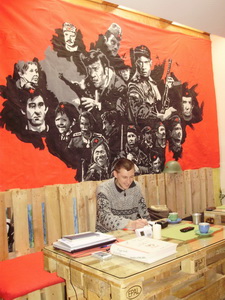 Two young men from Užice opened the Republic – the first hostel in the town upon the Đetinja River in August 2013, with 25 beds. In less than six months of work, they have welcomed visitors from 20 countries and, what’s most important, they have all promised them to come again.
Two young men from Užice opened the Republic – the first hostel in the town upon the Đetinja River in August 2013, with 25 beds. In less than six months of work, they have welcomed visitors from 20 countries and, what’s most important, they have all promised them to come again.
The numbers are accurate: 25 beds in 5 rooms; covering 200 square meters of space. Ever since its launch, on August 26, 2013, they welcomed several dozens of visitors from 20 countries. The interior decoration has been made from natural material. The rules of behaviour in the Republic Eco Hostel in Užice are directly linked to environmental protection and recycling: the lighting system and water supply system strictly obey environmental protection principles – the hostel is lit with cost-savings bulbs and in bathrooms they are taking care of each drop of water warmed owing to solar energy.
Young owners of this hostel which joined the Hostelling International global association in less than six months since its launch are two friends: Marko Ristovski (29) and Milan Bogojević (30).
Until a year ago, their names were on the list of the unemployed in the local branch of the National Employment Agency. Marko, a hotelier with vast experience in hotels and ocean cruises and Milan, a photographer and a cameraman have decided to launch their own business.
– We did not have the money but we did have the idea. We have travelled a lot and spent time in hostels. We have noticed that such capacities are not available in our town, Marko Ristovski explains.
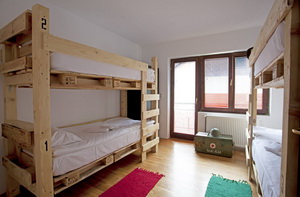 Although Zlatibor, one of the most visited tourist destinations in Serbia, is 25 kilometres from Užice, only one hotel works (or, to be more precise, survives) in this town.
Although Zlatibor, one of the most visited tourist destinations in Serbia, is 25 kilometres from Užice, only one hotel works (or, to be more precise, survives) in this town.
Marko and Milan believe that their business plan which took them one year to prepare reflects their seriousness. Ever since the beginning, the only thing that was sure was that environmental protection will be something they would not back down on. Another certain thing was the name, the Republic, based on the Republic of Užice from WWII.
– This area, among other things, is famous for the period in 1941, when we were the only unconquered territory by the Nazi, they explain.
Although without money, the two friends have received the first subsidy in the value of RSD160,000 at the competition for the launch of business among young people announced by the National Employment Agency.
– Our advisor was of great help. She told us about the competition. We have used these funds to rent a house. We experienced some trouble there because we could not find an adequate location from February to June, Marko adds.
Friends and families joined then. Preparations started, equipment for furniture they found at a military depot in Čajetina. The idea to make the furniture from Europanel is theirs. Young female designers are responsible for the final appearance of the exterior of the house.
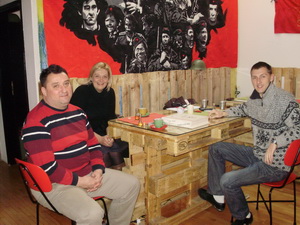 At the same time, they compete at the Green Ideas program of the Rockefeller Foundation, Erste Bank and the Trag Foundation. They admit they were surprised when they realized that they had won the competition and that their project was better than 109 projects from across Serbia. An award in the value of US$8,000 award comes in handy. They have used it to procure solar panels, namely a water processing system, to regulate the sanitary block.
At the same time, they compete at the Green Ideas program of the Rockefeller Foundation, Erste Bank and the Trag Foundation. They admit they were surprised when they realized that they had won the competition and that their project was better than 109 projects from across Serbia. An award in the value of US$8,000 award comes in handy. They have used it to procure solar panels, namely a water processing system, to regulate the sanitary block.
Out of US$1,200 granted within the Group 484 and USAID’s competition for business start-ups for young people they buy mattresses.
– By end August, while we worked at the hostel, when we were actually still preparing beds, first guests have knocked at our doors. A married couple from Germany. They were travelling to the seaside in Montenegro. They saw the billboards. Instead of one night as they initially planned, they have spent their entire vacation here – three weeks, Marko proudly recounts.
In addition to the concept of friendship with nature, they want to apply the global model to establish the contact between hotel managers and their guests.
– We are here to help them feel as if they were at a friend’s house and not in the facility where they are the guests and we are the staff, Marko adds.
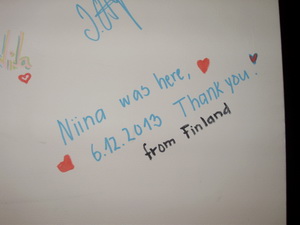 The only “mandatory” visit for guests is a visit to the Museum and they also offer visits to Mt. Zlatibor, the Ovčar Kablar Gorge etc. Elderly female tourists from England contacted them via their web site to ask them if they could come, having in mind that numerous hostels have specific age requirements.
The only “mandatory” visit for guests is a visit to the Museum and they also offer visits to Mt. Zlatibor, the Ovčar Kablar Gorge etc. Elderly female tourists from England contacted them via their web site to ask them if they could come, having in mind that numerous hostels have specific age requirements.
A guest from Croatia, Đurđica Đukelić, had this kind of prejudice too. She spent one night in Užice with her husband. She was there to defend her bachelor thesis at the Faculty of Teacher Education.
– The first thing on my mind was: God, how can I stay at a hostel but after I talked to the managers and when I saw the pictures on the website, I was thrilled, she says with a smile, and she was more than satisfied with the service.
She will most certainly recommend the hostel to her young relatives. Đurđica says that she stayed in a hostel only once before, in Bulgaria.
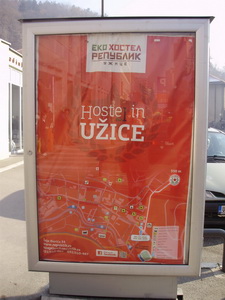 – I was not satisfied there and I cannot compare this with these beautiful and clean rooms and amicable hosts, she explains.
– I was not satisfied there and I cannot compare this with these beautiful and clean rooms and amicable hosts, she explains.
The figures we mentioned at the beginning of this story show that everything was not that simple at the beginning, and Marko admits that they sometimes wondered what was the purpose of all that.
– It is still difficult. We are still at the beginning and I believe that we are now at the break-even point: we settle our bills on time and our loan instalment. We manage to help other young people who launch business, such as a dry cleaner’s where we take our bedclothes. We are willing to do every chore, Milan, my girlfriend and I. We do everything. We hope to be able to say that we have succeeded in three years.
Young and hard-working people have a lot of ideas for this year. Including the organization of walking partisan tours and adrenaline rush programmes. They are preparing a website in five languages and they do not have any doubt that they will continue to have enough guests as they do now.
 Government of the Republic of Serbia
Government of the Republic of Serbia















 pdf [271 KB]
pdf [271 KB]
Leave a Comment